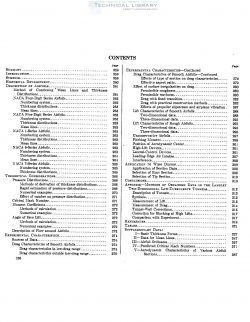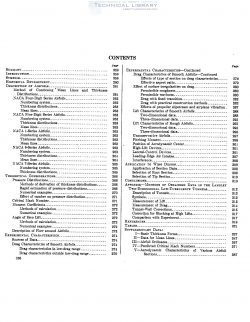naca-report-824

- Version
- 1726 Downloads
- 20.02 MB File Size
- 1 File Count
- August 31, 2016 Create Date
- August 31, 2016 Last Updated
National Advisory Committee for Aeronautics, Report - Summary of Airfoil Data

Recent airfoil data for both flight and wind-tunnel tests hare
been collected and correlated insofar as possible. The flight
data consist largely of drag measurements made by the unhe—
sureey method. 310st of the data on airfoil section characteris-
tics were obtained in the Langley two-dimensional low-turbulence
pressure tunnel. Detail data necessary for the application of
NACA 6-series airj'oils to wing design are presented in sup—
plementary figures, together with recent data for the NACA 00—,
14-, 24-, 4.4-, and 230-series aiuroils. The general methods
used to derire the basic thickness forms for NACA 6- and
’f—series aizj'ails and their corresponding pressure distributions
are presented. Data and methods are giren for rapidly obtain-
ing the approximate pressure distributions for NACA four-
digit, fire-digit, 6-, and 7-series airfoils.
The report includes an analysis of the lift, drag, pitching-
moment, and critical-speed characteristics of the airfoils, to—
gether with a discussion of the ejects of surface conditions.
Data on highqlift devices are presented. Problems associated
with lateral—control dem'ces, leading~edge air intakes, and inter-
ference are briefly discussed. The data indicate that the efi‘ects
of surface condition on the lift and drag characteristics are at
least as large as the ejects of the airfoil shape and must be
considered in airfoil selection and the prediction of wing charac-
teristics. Airfoils permitting extensive laminar flow, such as
the NADA 6-series ain’oils, hate much lower drag coefficients
at high speed and cruising lift coeficients than earlier types of
airfoils if, and only if, the wing surfaces are suficiently smooth
and fair. The NAOA 6-series airfoils also have fararable
critical-speed characteristics and do not appear to present
unusual problems associated with the application of high-lift
and lateral-control devices.
| File | Action |
|---|---|
| naca-report-824 Summary of Airfoil Data.pdf | Download |
Comment On This Post